Euro-Integration
“Over the last 7 years (2007-13) only through the EU Cohesion Funds (the biggest in the EU’s regional assistance) the member states are supposed to receive about € 350bn attributed to more than 450 national and regional projects in the 27 member states. 
For example, in the Baltic States, Latvia will get € 4,6bn, Lithuania – € 6,9bn and Estonia – € 3,4bn; just to compare, Poland has got already € 67bn of the EU development grants since it joined the EU in 2004…
Over the next 18 months, the EU-27 governments will decide on the block’s next “financial programming” for 2014-20 with a total expenditures at the level of 1 trillion Euros… According to the Commission’s proposal published at the end of June 2011, the spending figures are the following (out of total € 1,025bn for the whole 2014-20 period) in %:
Economic growth & cohesion – 48;
Common agricultural policy – 27,5;
Other natural resources spending – 10;
Global action – 6,8;
Administration – 6,1;
Security & citizenship – 1,8.
Main contributors to the EU budget are known well: Germany, France, Italy, Sweden, the Netherlands, the UK and Denmark, which “donate” the lion share of the EU-27 budget. The main recipients are well known too: Poland, Greece, Belgium, Hungary, Portugal and the three Baltic States, though in much less degree…
The new EU member states from Eastern Europe are afraid that “milking the EU budget” through cohesion funds would come to an end. The Commission authorities argued that these worries were groundless: in the budget proposal the cohesion funds equal 37 per cent of the total budget (which is actually 2 per cent more that in the previous budget term).
However, some say, there are some grounds for assistance’s reduction, e.g. in the cohesion fund a new line of expenses is envisages, so–called “connectivity fund” of about € 40bn aimed to build cross-border infrastructure projects. In fact, these projects include high-speed railways and pipeline connections which might be of a primary benefit for the rich member states.
Besides some proposed changes in the eligibility rules for various EU funds would make in more difficult for poorer states to get financial support.
According to a Polish study, wealthy states can benefit from cohesion funds for the Eastern members: each euro in cohesion financing in Poland gives 36 cents to the richer states in the form of additional demand for goods and services. (Financial Times, 22 August 2011, p.5)…”
Article – Eugene Eteris – The Baltic Course.
Estonia, “the eurozone is our achievement!”
16 Oct 2011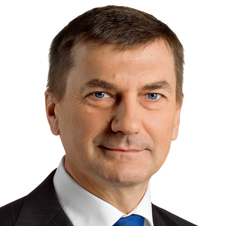 “For several years now the world has lived in the shadow of the recession. Indeed, for some member states of the European Union, the financial crisis still looms large, and it is consequently affecting the eurozone as a whole. But although the recession hit hard, it highlighted Europe’s ability to react to serious problems in an effective way…
“For several years now the world has lived in the shadow of the recession. Indeed, for some member states of the European Union, the financial crisis still looms large, and it is consequently affecting the eurozone as a whole. But although the recession hit hard, it highlighted Europe’s ability to react to serious problems in an effective way…
Having only acceded to the eurozone this year, the government of Estonia is frequently asked whether we regret our decision to adopt the euro at a time when we have to support countries for whose problems we are entirely blameless. The answer I give has always been, and will always be, the same: the euro is of enormous benefit to Estonia in any event, which is why we view our transition to the single currency as such an achievement.
At the same time, being part of the eurozone means that we have to meet all of the obligations that this entails. It is a question of solidarity, which is one of the cornerstones of the EU. We do not know when we may need the help and support of others; providing it is a moral duty. Moreover, it means that a crisis situation in one member state of the eurozone is far from being just that country’s problem: in a common market, one nation’s concerns are shared by everybody.
Of course, we should not forget that every country is still primarily responsible for its own economy and finances, which is why the loans from the support funds are issued on such strict conditions. Measures designed to promote growth will only work once a country has put its finances in order: public services cannot be provided using borrowed money, and doing so is neither sustainable nor morally justifiable. Consequently, this financial support, coupled with decisive action on the part of governments, will ensure the desired results and emergence from the crisis…
In Estonia we did not only keep our revenues and expenditures in balance, but were guided by the principle that its pays to boost your financial reserves when the general economic situation allows you to do so. Although there were recommendations to increase the level of public debt, the Estonian government decided against this and also did not use its reserves for a kind of ‘economic doping’. If we had done so, we would not only have to repay loans, but would also be accruing substantial amounts of interest – happily we are now able to invest that money in new economic growth.
On average, the EU spends 3 per cent of its gross domestic product every year paying interest on loans; in Estonia, however, we only pay 0.2 per cent, whilst also earning more from the placement of our reserves than we pay in interest overall. Furthermore, Estonia has the lowest public sector debt in the EU, which stands at 6.6 per cent of GDP.
Hopefully we will soon be speaking of the financial crisis in the past tense, enabling us to focus our efforts on the other challenges facing the EU. It seems strange, for instance, that we have yet to fully develop the internal market that forms the basis of our economic growth and wellbeing. For Estonia, the development of the internal market means, first and foremost, its adaptation to the demands of the digital age. Business operators and ordinary citizens alike must be able to carry out processes via electronic channels with other countries as easily as they are able to do so in their own nation. If this does not happen, there is no point to the term internal market in the context of the EU.
Estonia, however, has good reason to be satisfied with the e-services it provides… Estonian citizens have come to take the likes of the e-Tax and Customs Board and e-elections for granted, not to mention the other services that reduce bureaucracy and make their lives much simpler.
The Arab spring, meanwhile, has brought another serious problem to the attention of the EU this year: illegal immigrants and refugees. To some extent this has tested the very principles on which the EU is based: the debates that ignited earlier in the year about reinforcing the Schengen zone included proposals regarding the temporary closure of borders. The reinforcement of the Schengen zone is not about restoring national borders, but restoring trust. Doing so depends on us acting together – it is important that all member states fulfil their obligations on an equal footing and help those having difficulty meeting theirs.
Reinstating national borders is something we can and should only consider under exceptional circumstances. It must be the last resort in a situation where requirements are not being met and there are no signs of improvement. Even then a collective decision would be needed. Understanding and compassion must be shown to refugees, who are seeking security and a sense of certainty – positive assurances that the EU offers to its own citizens. Over the decades the EU has grown into an area of great stability that no crisis has yet managed to destroy.
The bigger this area of stability is, the better for the EU as a whole. It is for this reason that Estonia is one of the countries that supports, in principle, the continued expansion of the EU, since this will underpin peace and stability in Europe. As such, we must keep our door open to those who share our values and who are willing to work hard to meet the conditions of accession.”
Andrus Ansip, Prime Minister of Estonia. Complete Article In PublicServiceEurope
La Polonia continua nel suo corso liberale – riformista. Questo l’esito delle insidiose legislative, assolutamente non così scontate come potrebbe sembrare. Per la prima volta dal crollo del Muro di Berlino un partito ottiene un secondo mandato consecutivo. A Varsavia si è forse trovato il giusto equilibrio tra stabilità e sviluppo. E la notizia non può che far piacere all’intera Europa.
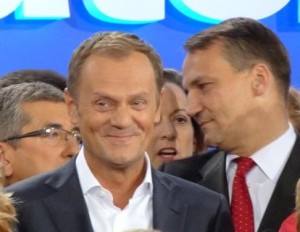
Donald Tusk ed il ministro Sikorski
Sono stati definitivamente sconfitti i fantasmi passati e più recenti. Con l’adesione all’Unione europea nel 2004 è entrato nei libri di storia il secolare penalizzante scenario di un Paese geostrategicamente schiacciato tra Russia e Germania. Gli ultimi tentativi in campagna elettorale di risvegliare i vetusti incubi sopiti nell’animo della nazione polacca non hanno prodotto risultati.
Varsavia è ormai pienamente dentro al processo di integrazione continentale. I suoi sostenitori sono in netta maggioranza. Sebbene Washington e gli Stati Uniti continuino ad essere per lei un punto di riferimento e di ispirazione il primato d’oltreoceano è ora messo in seria discussione da Bruxelles.
Neanche il premier Donald Tusk si aspettava una vittoria così. La sua espressione di entusiasmo nell’apprendere gli exit polls ne è la prova. L’ex dissidente liberale di Danzica ha evitato uno dei tanti colpi di coda così frequenti nella storia del Paese. Nelle ultime settimane i conservatori capeggiati dall’euroscettico Jaroslaw Kaczynski si erano tremendamente avvicinati, fermandosi al 30%.
La Polonia è oggi divisa in due, tra chi gode del boom economico e chi ne è rimasto fuori. Tusk ha, però, vinto perché ha collezionato una serie di successi. Ad esempio la Polonia è l’unico Stato Ue a non essere caduto in recessione nel 2009 anche grazie ai copiosi fondi strutturali europei (elargiti anche come ricompensa per l’abbandono del Paese nelle mani sovietiche dopo la fine della guerra) ed agli investimenti stranieri, soprattutto statunitensi.
La grande sorpresa di queste elezioni è rappresentata dall’incredibile avanzata nella cattolicissima Polonia della lista “anticlericale” dell’imprenditore Janusz Palikot, che si batterà per i diritti dei gay e la liberalizzazione della marijuana. In caduta libera sono, invece, gli ex comunisti, ora socialdemocratici, di SLD.
Inizia adesso per Tusk un nuovo mandato, più complicato del primo, soprattutto per la crisi economica internazionale. Oltre al rischio tipico di sedersi sugli allori, si devono gestire al meglio la trattativa in corso sul budget Ue 2014-2020 (a Varsavia dovrebbero andare 81 miliardi, nel precedente 67), l’importantissima vetrina dei campionati europei di calcio nel 2012 ed una maggiore liberalizzazione dell’economia. Vincere queste sfide, non dimenticandosi delle ampie differenze interne, garantirà alla Polonia un futuro di prosperità.
Tusk contro Kaczynski. Il liberale contro l’ultra conservatore. Il moderno filo-occidentale, attualmente leader semestrale di turno dell’Unione europea, contro l’euroscettico, che critica pesantemente i nemici storici tedeschi e russi.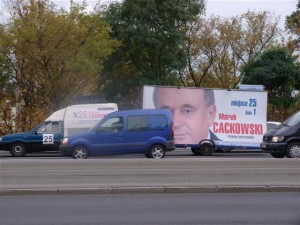
I polacchi, che appaiono sempre più divisi tra coloro che godono del boom economico di questi anni e chi invece si è ulteriormente impoverito, scelgono tra due visioni opposte. Non è un caso che il premier Donald Tusk abbia chiuso la sua campagna elettorale incontrando a Varsavia migliaia di ragazzi nel rinnovato stadio nazionale, simbolo della Polonia post comunista e fiore all’occhiello di Euro 2012. Jaroslaw Kaczynski, al contrario, ha preferito partecipare ad un pranzo tradizionale in provincia, ospite di una semplice famiglia. Città contro campagne, dunque. Giovani contro generazioni più mature.
Venerdì sera colpiva il visitatore straniero osservare il contrasto tra una decina di anziani con le candele in mano raccolti in preghiera davanti al palazzo presidenziale in ricordo dei morti della tragedia aerea di Smolensk dell’aprile 2010, mentre tutto intorno bar e ristoranti, pieni all’inverosimile di persone mezze ubriache appartenenti alla classe media, sparavano musica a tutto volume.
In queste tese settimane Tusk ha parlato di economia, di riforma delle pensioni, di controllo del deficit di bilancio e del debito (addirittura il 55% del Pil!). Il Paese, che sta gestendo le trattative per il bilancio continentale UE 2014-2020, è prossimo a nuove privatizzazioni ed alla costruzione di altre infrastrutture, finanziate sempre con i fondi europei (67 miliardi di euro nel precedente bilancio UE, forse 81 nel prossimo). Durante il suo premierato gli stipendi medi sono aumentati del 18%, la Polonia cresce da un decennio al ritmo del 3% ed è l’unico Stato Ue a non essere caduto in recessione nel 2009.
Jaroslaw Kaczynski, che non ha perso la sua bellicosità dopo la tragica morte del fratello-gemello presidente Lech a Smolensk, ha ribattuto punto su punto, aiutato dai candidati del suo partito Legge e Giustizia. Non ha, però, mancato di risvegliare i vecchi fantasmi, affermando che la Merkel è diventata cancelliera anche grazie alla Stasi, i servizi segreti della DDR.
L’ago della bilancia della partita potrebbero essere gli altri contendenti. Solo 5 formazioni – affermano sondaggi contrastanti – dovrebbero superare la barriera del 5%, per avere una rappresentanza parlamentare. Molto dipenderà dal tasso di affluenza alle urne e dalla performance di PSL, alleato di coalizione di Piattaforma civica di Tusk, mentre sorprende la forza della Lista “anticlericale” di Janusz Palikot a scapito dei socialdemocratici di SLD.
Se Piattaforma civica vincerà sarà il primo partito dal 1989 ad ottenere due mandati consecutivi. La paura della classe media nazionale e della Commissione europea è, però, che inizi un periodo di instabilità politica anche in Polonia. Un altro mal di pancia per Barroso e company non ci vorrebbe proprio!
“Thousands of minority Poles on Friday protested a new law in Lithuania that they claim discriminates against them and could diminish their education by demanding greater knowledge of the Lithuanian language.
The protests outside Parliament in the capital Vilnius underscored the contentious issue of language rights in Lithuania, a subject that has been the cause of tension in its relations with Poland.
Ethnic Poles number about 200,000 of Lithuania’s 3 million citizens, mainly the result of shifting borders after World War II. Many of these Poles speak Polish at home and attend Polish-language schools. But the law, which passed in March and took effect in July, introduces standardized Lithuanian exams for all upper-class students, which minorities believe will put them at a disadvantage vis-a-vis native speakers….
Waldemar Tomaszewski, a member of the European Parliament from Lithuania, said the government should “postpone this law until 2018 or maintain the right for students of ethnic minorities to pass exams in their native language.”
Over the past year, the language issue has led nationalist politicians in Poland and Lithuania to trade barbed criticism. Lithuania’s Polish residents are upset that they cannot spell their name in legal documents with the letter ‘w‘ _ a prominent letter in Polish that doesn’t exist in the Lithuanian alphabet…”
Full Article – Associated Press – Taiwan News
Baltic energy security. EU funds from Brussels.
20 Aug 2011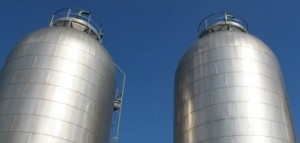 “Lithuania seems to start realizing the projects leading toward energy security and reduction of dependence on one supplier (Russia). These projects (energy connections with Poland and Sweden, a planned gas pipeline between Lithuania and Poland etc.) will be realized with the EU assistance as part of the Baltic Energy Market Interconnection Plan (BEMIP).
“Lithuania seems to start realizing the projects leading toward energy security and reduction of dependence on one supplier (Russia). These projects (energy connections with Poland and Sweden, a planned gas pipeline between Lithuania and Poland etc.) will be realized with the EU assistance as part of the Baltic Energy Market Interconnection Plan (BEMIP).
This EU plan can be divided into two parts: development of the electricity sector and development of the gas sector. The latter is relevant in considering the construction of liquefied natural gas (LNG) terminals in the eastern Baltic Sea region. Lithuania, Latvia, Estonia and Finland are still isolated from the integrated EU gas supply system. According to BEMIP these states are referred to as a single segment, therefore one of the key goals is their integration into the EU gas supply system.
All three Baltic States declared their willingness to construct LNG terminals. Lithuania is determined to build a small-size terminal independently, i.e. without the EU’s financial assistance. Its capacity could be 2-3 billion cubic meters of gas per year (primarily for the internal use). The so-called Kiaules Nugara (Pig’s back) island in the Kursiu Lagoon (close to Klaipeda) has been chosen for the construction of the terminal. Lithuania has selected the US company “FluorInternational” as lead adviser for preparation and implementation of the project….more”
Article – Rimvydas Ragauskas – Geopolitika
Giuseppe D’Amato Travel to the Baltic Hansa, Greco&Greco, Milano, 2004.
Primo luglio 2011. La Polonia è in festa. Il Paese dalla “tanta storia e poca geografia” ha assunto per la prima volta la presidenza dell’Unione Europea, completando quel durissimo percorso iniziato subito dopo l’uscita dalla sfera di influenza sovietica alla fine della Guerra Fredda. 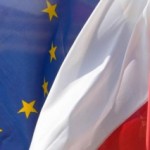
La Polonia è oggi un esempio di democrazia normale e moderna con un’economia solida e dinamica. Ma non sono state tutte rose e fiori per ottenere questo risultato. Il referendum di adesione all’Ue, con la discesa in campo persino di Papa Wojtyla, fu vinto a fatica nel giugno 2003. Quanta la paura dell’ennesimo scherzo della storia! Ricordiamo ancora le lacrime della gente, quando, nella notte del primo maggio 2004, la bandiera europea salì nel cielo di Varsavia a piazza Pilsudski, mentre il mattino successivo il centro cittadino fu paralizzato dalla protesta di migliaia di euroscettici. Le successive elezioni dell’autunno 2005 furono vinte dai gemelli Kaczynski alla testa di un partito che radunava scontenti ed ultra-conservatori.
I pesanti costi sociali per l’adesione all’Ue sono stati mitigati dai fondi strutturali (67 miliardi dal 2007 al 2013), giusta compensazione dell’Occidente per aver abbandonato la Polonia per quattro decenni nelle mani dei sovietici. Il boom economico, aiutato dai forti investimenti stranieri – soprattutto d’oltreoceano -, ha fatto il resto. Le città si sono arricchite tanto che si fa fatica a riconoscerle rispetto a come erano all’inizio del secolo. Finalmente i polacchi sono diventati fiduciosi nell’Unione. In un sondaggio gli euroentusiasti sono vicini all’80%.
Nella sua qualità di presidente dell’Ue la Polonia gestirà la complessa trattativa per la definizione del budget continentale 2014-2021. La Commissione europea le ha già garantito ben 80 miliardi di euro di nuovi fondi strutturali sui 972,2 del bilancio totale continentale. Varsavia intende aprire la strada all’Associazione all’Ue dell’Ucraina, Paese vicino col quale ospiterà la tanto attesa vetrina degli Europei di calcio nel prossimo giugno 2012, concludere i negoziati con la Croazia e migliorare ulteriormente i rapporti con la Russia.
In Europa ci sono anche esempi positivi non solo la Grecia o i PIGS o l’Italia che balbetta da un decennio. L’economia di Varsavia viaggia a tassi di espansione “alla tedesca”. Ecco perché la Polonia di Donald Tusk si candida a diventare una “Spagna”, ma dalle fondamenta salde, di questo decennio.
Giuseppe D’Amato
Our Polish EU Presidency.
30 Jun 2011
Logo
Polish Prime Minister Donald Tusk presented information in Parliament concerning the priorities of the Polish Presidency, which will commence on 1 July this year. The Prime Minister emphasised that during the Presidency the government wants not just to maintain but to increase Poland’s status as a responsible and highly valued state.
“It is expected that the Presidency will allow us to jointly create political leadership which does not consist of taking routine decisions but which may help the EU as a whole,” he said. “It is of paramount importance that during the Presidency we can maintain and increase Poland’s status as a country which is highly valued in internal EU debates and which demonstrates a high level of responsibility with regard to the EU’s foreign relations,” he underlined, adding that Poland will also want to maintain and increase its status as a responsible country in dealing with economic and financial issues.
The Prime Minister stressed that Poland has developed its image as a state which is capable of being a new driving force in the European Union. “Today Poland is treated as one of the leaders – of which unfortunately there are few in the EU – which strive to force through issues of EU-wide significance,” stated the Prime Minister. In his view, from the beginning of the economic crisis Poland constantly came out against the revival of state control and nationalism which was visible in the actions and statements of some politicians and EU Member States.
Mr Tusk drew attention to the fact that it is important for good political initiatives to emerge during the Polish Presidency. “We have a significant interest in Poland’s Presidency being remembered by Europeans through issues including the finalising of long-term processes,” he said. “It is possible that during the Polish Presidency we will see the completion of negotiations with Croatia, which would mean that the accession treaty will be signed during the Presidency,” stated the Prime Minister. He added that completion of negotiations with Ukraine on an association agreement and agreement on free trade is also realistic. “This would be the first successful step in the process of bringing Ukraine closer to Europe,” the Prime Minister stated.
Full article – Polish Presidency of the EU.
Baltic region. New challenges, old adversaries.
20 Jun 2011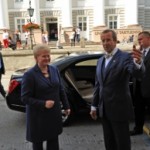 How to prevent future threats to the Baltic region was the main topic at the Estonian – Lithuanian summit, held in Tartu. The two states seek to become NATO’s energy and cyber security hubs not forgetting a recent period of tension with Russia.
How to prevent future threats to the Baltic region was the main topic at the Estonian – Lithuanian summit, held in Tartu. The two states seek to become NATO’s energy and cyber security hubs not forgetting a recent period of tension with Russia.
Estonian President Toomas Hendrik Ilves assured the support of his country in developing the energy security centre in Lithuania into a NATO Centre of Excellence, as the alliance’s cyber defence centre in Tallinn. His Lithuanian colleague Dalia Grybauskaite highlighted that both countries are united by the common goal of preventing the use of energy as a political tool. It is therefore necessary to speed up the integration of the Baltic States’ electricity market into the Nordic market (NordPool), to diversify energy supplies and to reduce dependence on a single supplier.
Mrs. Grybauskaite said that his country supported the construction of a LNG terminal in Estonia or in Latvia, but it had decided to build its own terminal in Klaipeda. She pointed out that several terminals operating in the Baltic countries would increase competition in the gas market, ensure lower consumer prices and strengthen the region’s energy independence.
“Estonia is still interested in participation in the Visaginas nuclear power station,” President Ilves assured, adding that Eesti Energia is currently considering the offers of two potential investors. “Let us hope that the negotiations for finding and involving a strategic investor will be successful and the new nuclear power station will be a project that will really enhance the energy security and independence of the region considerably.”
Speaking about cyber security, Mrs. Grybauskaite proposed to follow the recommendations of the former foreign minister of Norway, Jens Stoltenberg, and to form a Nordic-Baltic cyber defence force.
For a further European integration Mr. Ilves said that “When can we take a high-speed train from Estonia, through Latvia and Lithuania, to Berlin? When will we finally have a modern Via Baltica, which connects all of us and then runs further, to Poland? When will the Baltic states no longer be an energy isle, separated from the rest of Europe? The answers to these questions will also represent our evaluation of the health of our regional co-operation in the 21st century.”
Presidents Ilves and Grybauskaite discussed the neighbourhood policies of the European Union, with an emphasis on Ukraine, Georgia, Moldova and Belarus.
“The government in Minsk, which talks to its people in the language of batons and imprisonment, is not fit to be a part of today’s Europe. In this case, the European Union should use powerful words to provide balance, by uniting its voice with its mind; the pressure on the Belarusian regime needs to be powerful and efficient, with all sanctions very accurately aimed,” President Ilves added.
Travel to the Baltic Hansa, book by Giuseppe D’Amato.
The European Union and Russia are not only neighbours but also strategic partners. At the upcoming 27th summit, in Nizhny Novgorod, the EU will be represented by Herman Van Rompuy, President of the European Council and by José Manuel Barroso, President of the European Commission. Catherine Ashton, High Representative of the Union for Foreign Affairs and Security Policy, and Karel De Gucht, Commissioner for Trade, will also take part. Russia will be represented by Dmitry Medvedev, President of Russia. Foreign Minister Sergey Lavrov and Minister of Economic Development Nabiullina will also participate. The summit will take place over two days, beginning with an informal dinner on 9 June and continuing with a plenary session on the morning of 10 June, followed by a working lunch and a press conference. 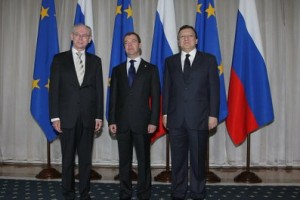
The parties are expected to discuss the following issues:
the global economy and global governance issues;
EU-Russia relations, in particular the EU-Russia Partnership for Modernisation;
international issues, including the developments in North Africa and the Middle East.
The Summit will on build on the good results achieved at last year’s EU Russia Summits, held in Rostov and Brussels.
The EU and Russia will take note of the good progress made in the implementation of the EURussia Partnership for Modernisation, which is a key initiative providing additional momentum to ongoing work in the Dialogues under our Common Spaces. The EU and Russia will discuss the state of play in the negotiations on Russia’s accession to the WTO, which are now at multilateral level. The new EU-Russia Agreement, which is currently being negotiated, should provide a solid basis for deepened bilateral relations in the 21st century covering all areas of EU-Russia relations.
A growing economic relationship
Economic ties between Russia and the EU have grown substantially over the last years. Russia remains the EU’s third most important trading partner in goods (after the US and China), with 87 billion EUR in exports to Russia (6.4% of all EU exports, 4th place after US, China, Switzerland) and 155 billion EUR in imports in 2010 (10.4 % of all EU imports, 3rd place after China and US, mostly natural resources). The EU is thus by far the largest market for Russian goods.
In 2010, both imports and exports rose by approximately 32 % compared to 2009, after having been hit by the global economic crisis. Russia enjoyed a trade surplus of 68 billion EUR with the EU. Russia’s total account surplus rose by 47% compared to 2009 and reached $ 79 billion in 2010. More specifically, Russia is the EU’s most important single supplier of energy products, accounting for over 25% of the EU consumption of oil and gas. In turn, Russia’s economy remains highly dependent on the export of energy raw materials, with the EU as its most 2 important destination. In 2010 63% of Russia’s exports consisted of crude oil, oil products and natural gas. The EU accounts for 88% of Russia’s total oil exports, 70% of its gas exports and 50% of its coal exports.
Financial cooperation
Financial cooperation with Russia began in the early 1990s, under the TACIS program, which has in the meantime been replaced by the European Neighbourhood and Partnership Instrument. To help smooth Russia’s transition, a whole range of sectors were supported. Since 1991, a total of around €2.8 billion of assistance was provided through the European Commission. A number of TACIS projects are still being implemented until 2013. Given the significant recent improvements in the Russian Federation’s fiscal position, the need for large volumes of financial assistance has declined. In fact, Russia herself has become a donor. Financial cooperation is now specifically targeted to meet the objectives defined in the road-maps to the EU-Russia Common Spaces. Cooperation is now carried out on the principle of co-financing by the EU and Russia. Most notably, Russia is co-financing Cross Border Cooperation programmes. Emphasis is on higher education cooperation, with Erasmus Mundus and Tempus supporting mobility of students and teaching staff.
Furthermore, funding for Russia also came from the Nuclear Safety Instrument (€500 million since 1991) and a number of other thematic programs. The European Democracy and Human Rights Instrument (EIDHR) financed 14 human rights projects in Russia in 2010 for nearly € 2 million, and the Institution Building Partnership Programme supported 16 projects with NGOs for a total of € 5 million.
EU-Russia relations – background
The legal basis for EU relations with Russia is the Partnership and Cooperation Agreement (PCA) which came into force on 1 December 1997 for an initial duration of 10 years, and which has been automatically extended beyond 2007 on an annual basis. It sets the principal common objectives, establishes the institutional framework for bilateral contacts, and calls for activities and dialogue in a number of areas. The EU is currently working with Russia on a new agreement to replace the PCA. Both the EU and Russia have experienced many political, economic and social changes since the entry into force of the PCA in 1997. The new agreement must reflect these changes as well as the new challenges linked to the globalised world in which we are living. At the St. Petersburg Summit in May 2003, the EU and Russia agreed to reinforce their cooperation by creating four “common spaces”:
the Common Economic Space aiming to make the EU and Russia’s economies more compatible to help boost investment and trade;
the Common Space on Freedom, Security and Justice covering the area also known as Justice and Home Affairs;
the Common Space on External Security aiming to enhance cooperation on foreign policy and security issues; and
the Common Space on Research, Education and Culture aiming to promote scientific, educational and cultural cooperation.
Materials from the site of the European Delegation to Russia.
Welcome
We are a group of long experienced European journalists and intellectuals interested in international politics and culture. We would like to exchange our opinion on new Europe and Russia.
Categories
- Breaking News (11)
- CIS (129)
- Climate (2)
- Energy&Economy (115)
- EU Eastern Dimension (85)
- Euro 2012 – Sochi 2014 – World Cup 2018, Sport (43)
- Euro-Integration (135)
- History Culture (198)
- International Policy (261)
- Military (74)
- Interviews (18)
- Italy – Italia – Suisse (47)
- Odd Enough (10)
- Poland and Baltic States (126)
- Religion (31)
- Russia (421)
- Survey (4)
- Turning points (4)
- Ukraine (176)
- Российские страницы (113)
Archives
- November 2020
- October 2020
- September 2020
- August 2020
- July 2020
- May 2020
- April 2020
- March 2020
- January 2020
- December 2019
- November 2019
- October 2019
- September 2019
- August 2019
- July 2019
- June 2019
- May 2019
- April 2019
- March 2019
- February 2019
- December 2018
- November 2018
- October 2018
- September 2018
- August 2018
- July 2018
- June 2018
- May 2018
- April 2018
- March 2018
- February 2018
- January 2018
- December 2017
- November 2017
- October 2017
- September 2017
- August 2017
- July 2017
- May 2017
- March 2017
- January 2017
- December 2016
- November 2016
- October 2016
- September 2016
- July 2016
- June 2016
- May 2016
- April 2016
- February 2016
- January 2016
- November 2015
- October 2015
- September 2015
- June 2015
- April 2015
- March 2015
- February 2015
- January 2015
- December 2014
- November 2014
- October 2014
- September 2014
- August 2014
- July 2014
- June 2014
- May 2014
- April 2014
- March 2014
- February 2014
- January 2014
- December 2013
- November 2013
- October 2013
- September 2013
- August 2013
- July 2013
- June 2013
- May 2013
- April 2013
- March 2013
- February 2013
- January 2013
- December 2012
- November 2012
- October 2012
- September 2012
- August 2012
- July 2012
- June 2012
- May 2012
- April 2012
- March 2012
- February 2012
- January 2012
- December 2011
- November 2011
- October 2011
- September 2011
- August 2011
- July 2011
- June 2011
- May 2011
- April 2011
- March 2011
- February 2011
- January 2011
- December 2010
- November 2010
- October 2010
- September 2010
- August 2010
- July 2010
- June 2010
- May 2010
- April 2010
- March 2010
- February 2010
- January 2010
- December 2009
- November 2009
- October 2009
- September 2009
- August 2009
Our books




